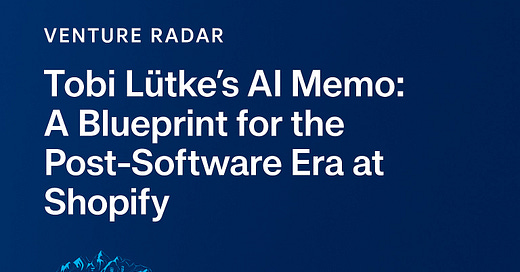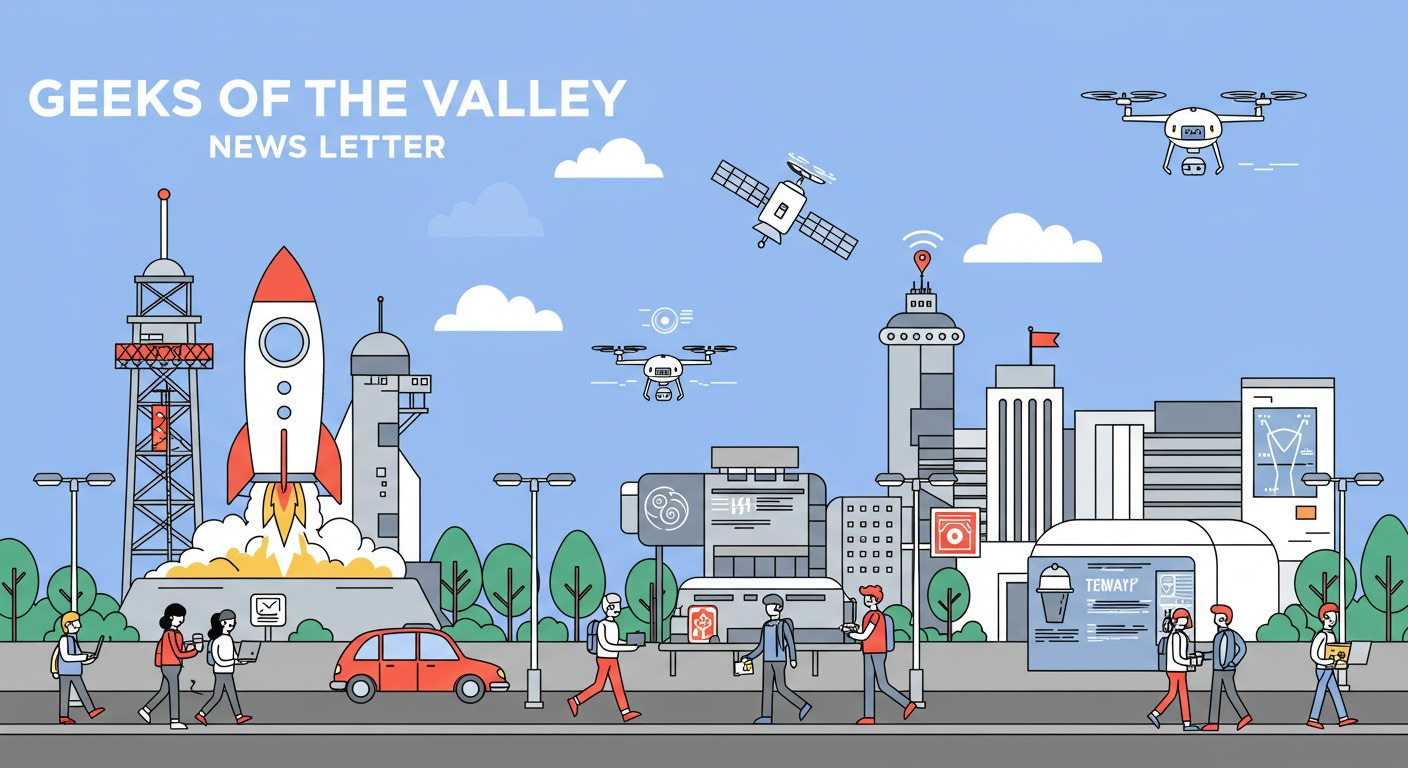Tobi Lutke’s AI Memo: A Blueprint for the Post-Software Era at Shopify
PLUS: Former Patreon’s core leadership building AI-native commerce
Venture Radar
Tobi Lutke’s AI Memo: A Blueprint for the Post-Software Era at Shopify
In early April 2025, Shopify CEO Tobi Lutke released a bold internal memo that immediately drew attention across the tech and business world. Titled “AI usage is now a baseline expectation,” the memo wasn’t just a note to employees - it was a clear signal that Shopify is doubling down on AI as a fundamental layer of its business operations. Lütke, known for his product-first leadership style and early bets on digital commerce infrastructure, laid out a direct challenge: adapt to AI or risk becoming obsolete within the company.
This memo arrives at a time when AI is no longer viewed as a “tool” but a foundational capability - similar to how cloud computing or mobile development once were. What Lutke articulates is not just a shift in tooling, but a systemic redefinition of how work gets done at Shopify, from individual contributor roles to strategic decision-making.
Why This Matters: Strategic Implications
AI isn’t a tool - it’s a new operating system.
The memo makes it clear: Shopify doesn’t just see AI as another tool in the tech stack. It sees AI as a new operating system for the company - one that governs not only how software is written but how decisions are made, resources are allocated, and value is created.
The goal is leverage, not just productivity.
Where many organizations are still focused on AI as a productivity enhancer (ie, “write faster emails” or “summarize this document”), Shopify is shifting the conversation toward leverage. By forcing teams to consider whether AI can do the job before hiring, Shopify is aiming to build a smaller, faster, more efficient company that can scale without bloating.
Shopify wants to be an AI-native company before it’s a competitive necessity.
Lutke’s move is preemptive. The AI transformation of business is inevitable, but most companies are slow to act. Shopify’s memo reads like a first-mover manifesto - a chance to build the company’s second act on a foundation of agility, automation, and algorithmic thinking.
A cultural test for tech workers.
For Shopify employees, this memo is a wake-up call. AI fluency will soon be a baseline expectation in hiring, promotion, and daily collaboration. Lutke is effectively telling his team: we are changing the rules of the game - and you need to change with them.
Broader Context: What This Signals for the Industry
Tobi Lutke’s AI directive is likely to be seen in retrospect as a turning point - not just for Shopify, but for how large tech companies integrate and operationalize AI across every layer of the business. While many companies are still cautiously experimenting with AI pilots, Shopify is treating AI like electricity: assumed, everywhere, and essential.
This memo joins a growing wave of similar leadership signals from other forward-thinking CEOs - including Satya Nadella at Microsoft, Brian Chesky at Airbnb, and Jensen Huang at Nvidia - all pushing their organizations to think AI-first, not just AI-aware.
But Lutke’s directive is perhaps the clearest articulation yet of what that actually means inside a tech company. It also sets a precedent: moving forward, any startup or scaled tech company that doesn’t encourage (or mandate) this level of AI fluency may start to look outdated.
Geeks of the Week
Startup Name: New Generation
Geography: US
One-liner: AI-native commerce experiences that instantly respond to customers and AI agents.
Founder(s) Background: Patreon’s core leadership, Founding design team for Facebook’s, EiR at Matrix.
Thoughts:
Leveraging generative AI, New Generation transforms traditional e-commerce websites into AI-native commerce experiences. By embedding intelligent, conversational agents directly into the shopping journey, the platform enables brands to offer real-time product recommendations, dynamic content delivery, and interactive user engagement - all through natural language interfaces. This approach redefines how customers interact with online stores, making the shopping process more intuitive, personalized, and conversion-focused.
With AI agents that act like digital sales associates, New Generation enhances customer discovery and decision-making - helping users find exactly what they need without navigating complex menus or static product pages. This not only increases conversion rates but also boosts average order value and customer satisfaction. For brands, it reduces reliance on manual merchandising and allows for real-time adaptation based on user behavior.
As consumer expectations shift toward personalization, automation, and instant gratification, New Generation’s conversational commerce engine addresses a critical gap in the e-commerce tech stack. By enabling “agentic commerce” without the need for major website overhauls, the platform offers a scalable, plug-and-play solution that is attractive to both emerging brands and established retailers.
In a market where AI adoption is accelerating and customer experience is a key differentiator, New Generation AI positions itself at the intersection of innovation and ROI. Its ability to increase engagement, reduce bounce rates, and elevate the digital shopping journey aligns closely with broader trends in retail tech - making it a compelling opportunity for investors looking to back the next generation of intelligent commerce infrastructure.
Founder(s) building in stealth
Deals of the Week
Venture funding activity remained robust over the past week, marked by several high-profile rounds across the US, Europe, and Asia. AI and enterprise SaaS continued to draw investor appetite, while fintech and biotech also saw notable traction. Key funding highlights include:
OpenAI – the San Francisco-based AI juggernaut – reportedly secured a massive $40B investment led by SoftBank, valuing the company at $260B. If confirmed, this would mark one of the largest private investments ever in a tech company, reinforcing OpenAI's dominance in the generative AI arms race.
Isomorphic Labs – an AI-first drug discovery platform based in the UK – raised $600M in a new round led by Thrive Capital. Backed by Google DeepMind, the company uses AI models to predict protein structures and accelerate pharmaceutical R&D timelines.
Solace – a healthcare navigation platform – closed a $60M Series B round led by Menlo Ventures. The company connects patients with trained advocates to help them manage complex healthcare experiences. With Medicare recently expanding reimbursement for advocacy services, Solace is well-positioned for rapid scale.
Scapia – an India-based travel and fintech platform – raised $40M Series B led by Peak XV Partners. The startup offers a travel-focused credit card and app targeted at younger consumers. The funding will support new product rollouts and team expansion.
Inn-Flow – a US-based back-office SaaS platform for hotels – secured $45M in growth equity from Mainsail Partners. The platform handles accounting, labor management, and business intelligence for thousands of hospitality clients, aiming to modernize hotel operations globally.
Pennylane – a French accounting and finance automation platform – raised €75M in fresh funding as it continues its push to become the go-to solution for European SMEs and accountants. The company hit unicorn status in 2024 and is doubling down on product development.
Axelera AI – a Netherlands-based AI chip startup – was awarded a €61.6M grant from the EuroHPC DARE project to accelerate development of its Titania chip for generative AI and computer vision applications. The funding highlights Europe’s deepening investment in AI infrastructure.
PyannoteAI – a Paris-based voice tech startup – raised $9M in a seed round led by Crane Ventures and Serena. The company specializes in “speaker diarization,” a technology that distinguishes individual voices in a conversation—an increasingly vital tool for transcription, meetings, and AI-human interaction.
Sagittal AI – a UK-based developer productivity startup – secured £2.2M in pre-seed funding to build “AI coworkers” that integrate seamlessly into dev workflows. Early interest from enterprise customers and VCs signals momentum for AI-native workplace tools.
Notable Mergers and Acquisitions
Strategic consolidation is picking up across the startup landscape, with venture-backed companies becoming both acquirers and attractive targets. From fintech to enterprise tech and consumer brands, startups are leveraging M&A to scale faster, unlock new markets, and broaden their product offerings.
One standout move came from UK-based specialist insurance startup Icen Risk, which sold a 49% stake to Zurich Insurance Group in a deal that reportedly values the company at £150 million. Icen provides risk coverage for M&A transactions - think tax liabilities and IP risks - and Zurich’s backing will supercharge its global distribution, especially across North America and Europe. The deal is a clear signal that incumbents are opting to buy innovation rather than build it.
In enterprise tech, Enabled Analytics, a Texas-based data infrastructure startup, merged with Ventas Consulting to strengthen its position in the digital transformation space. The combination brings deeper analytics capabilities and expands Enabled’s access to Fortune 1000 clients, representing a classic scale-up play in a highly competitive B2B software market.
On the consumer front, LesserEvil, a health-focused snack startup best known for its popcorn, was acquired by Hershey in a $750 million deal. The move allows Hershey to fast-track its entry into the “better-for-you” snacking category - an area growing far faster than traditional confectionery. For LesserEvil, the exit offers massive distribution and resources to compete with global brands.
In aviation-adjacent tech, regional airline startups Republic Airways and Mesa Air Group announced an all-stock merger, creating one of the largest regional carriers in the U.S. While not pure tech companies, both have made sizable investments in mobility innovation and flight operations software - making this one of the more ambitious operational mergers in the travel-tech ecosystem.
This edition is brought to you in partnership with Stella Capital.





